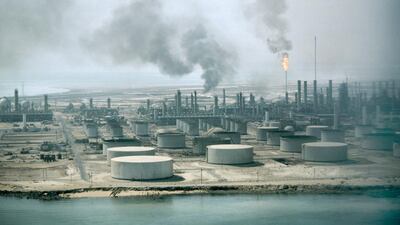Sales of petrochemicals, a key manufacturing industry that is central to the economic diversification agenda of regional governments, may slow down as regional buyers reassess spending levels once the UAE and Saudi Arabia introduce value-added tax (VAT) in 2018, according to analysts.
"The VAT, set to be imposed next year, could affect sentiment and spending patterns, although medium to longer-term impact remains unclear," Muhamad Fadhil, the head of Middle East markets for ICIS, an energy data provider, told The National.
The petrochemical industry is the second-biggest manufacturing industry in the GCC, representing 2.9 per cent of the GCC's GDP, according to the Gulf Petrochemicals and Chemicals Association (GPCA), a trade body that represents the regional petrochemical manufacturers. The GPCA noted that at a rate of 5 per cent, GCC annual chemical sales of US$14.5 billion will generate $725 million in VAT revenues that will be paid by the manufacturers to governments, while VAT taxation on the $21.6bn of chemical imports will raise $1.08bn.
"In the short term, plastic processing segments could see slightly slower growth if businesses or end consumers tighten their purse strings,” Mr Fadhil said. However, most are expected to absorb any VAT increase with the adequate lead time provided and exemption of taxation on a variety of goods and services.”
_______________________
UAE working on laws to boost non-oil sector contribution to 80% by 2021
Saudi petrochemical producer Sabic says second quarter profit falls 25 per cent
________________________
Governments in the region, which accounts for about a third of the world’s proven oil reserves, rely heavily on the sale of hydrocarbons for revenue. The fall in crude prices from the mid-2014 peak of $115 a barrel to current below $50 a barrel has crimped their spending power forcing budget deficits to widen. The Arabian Gulf states are now looking to transform their economies through the development of mining and value addition to the petrochemicals sector as they look to generate alternative revenues by levying new taxes and fees, including VAT and excise.
What happens to the regional petrochemical sector after implementation of VAT could be replicated in other sectors where the sales tax applies. However, vendors may not pass on the full cost of the tax to consumers to help boost sales at a time when slowing economic growth has made consumers wary of making purchases. Price cuts and promotions by vendors have helped to stoke consumer confidence, according to data from the Purchasing Manager's Index for the UAE that is produced monthly by Emirates NBD, Dubai's biggest bank.
Still, the standard VAT rate of 5 per cent being implemented in the UAE is well below the global average of 15 per cent, and economists say that it is unlikely to cause a huge spike in prices. At the same time, the tax will give a boost to state finances, netting in an estimated Dh12bn in the first year and Dh20bn in the second year, according to government officials.
"The introduction of the VAT is likely to have a one-time increase to general inflation, as the VAT is a consumption tax and a segment of retailers would likely pass the VAT on to consumers," said Dima Jardaneh, Standard Chartered’s head of economic research for Mena. "We factor in another increase in prices in 2018 assuming that VAT is introduced as planned."
VAT is being introduced in all member states of the GCC. Sultan Al Mansouri, the Minister of Economy, told The National this month that his ministry was working on a number of laws to help to increase the productivity of the economy and boost the contribution of the non-oil sector to 80 per cent by 2021 from about 70 per cent now.
Analysts say most businesses are prepared for the implementation of the tax, especially as the Government in the UAE has given more than a year for them to prepare. It is unlikely that the authorities will give any grace period to businesses that fail to comply from January 2018 VAT implementation deadline.
"The UAE has been issuing announcements in respect of VAT implementation at the standard rate of 5 per cent to commence on 1 January 2018, therefore businesses have had over 12 months to prepare," said Mandip Dulay, a director at Grant Thorton, an accountancy and consulting firm.

